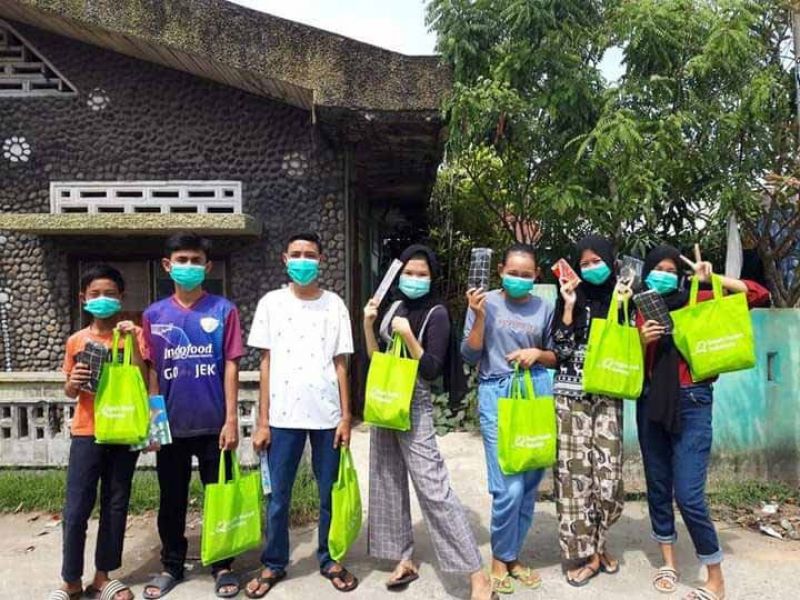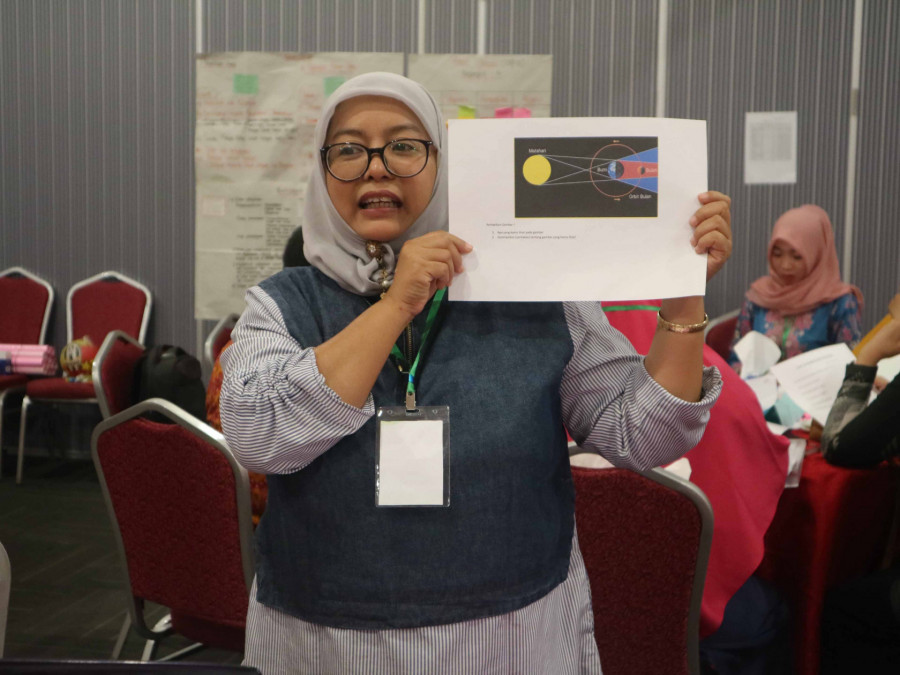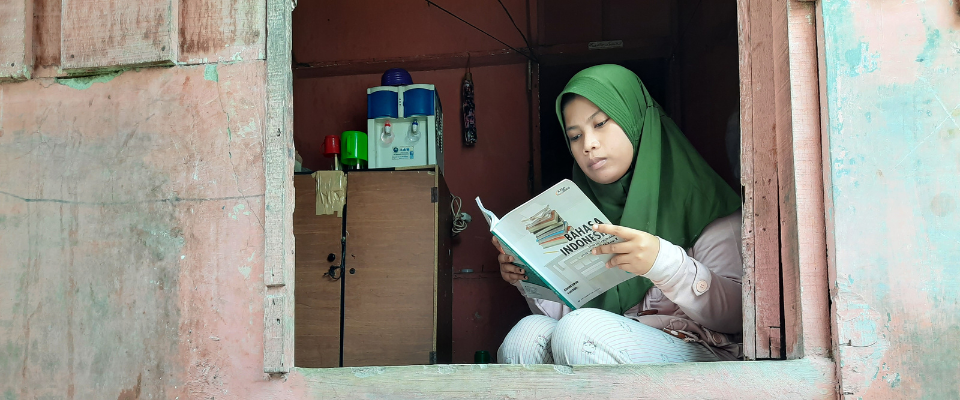One of the significant impacts of dropping out of school is the increasing number of children trying their luck on the streets, such as at traffic intersections in the city of Medan. Some resort to begging, selling newspapers or tissues, busking dressed as clowns, and some even paint their entire bodies with silver paint to appear like silver humans.
In reality, engaging in street activities is extremely dangerous and risky, especially for underage children. Apart from endangering their safety, it also further distances children from the opportunity to achieve a better future. They then lose access to education and also diminish their spirit and interest in school and learning because they are exposed to an environment that does not support a better direction.
Reflecting on my five years of experience working at Gugah Nurani Indonesia, focusing on fulfilling children's rights, we realize that school dropouts face complex issues. In one of our working areas located in Belawan, we encountered problems faced by children after they stopped attending school, such as underage marriages and involvement in criminal activities.
According to data from Belawan II Subdistrict, in the last five years, there have been at least 200 underage marriages. After getting married underage, they often face family conflicts, especially after having children. In interviews, they revealed experiences of physical and psychological violence from their partners or extended families. These girls, who should still be in school, are forced to enter the cycle of Domestic Violence (DV) and poverty due to lack of information in parenting for their children.
Dropping out of school has dreadful consequences, such as girls often experiencing domestic violence due to underage marriage, while boys tend to fall into criminal activities such as theft and other criminal behaviors that can lead to losses and even loss of life.
Based on our observations and discussions, the main causes of dropping out of school are a poor environment with high drug circulation, parents' divorce due to drug-using fathers, and children's involvement in earning money, thus deeming education unimportant. Low parenting patterns also contribute to the high dropout rates.
From our extensive fieldwork experience, we conclude that dropping out of school marks the beginning of a dark period for children in Belawan and threatens their future. According to data from the Ministry of Education, Culture, Research, and Technology (Kemdikbud Ristek), in the academic year 2020/2021, there were 83.7 thousand school dropouts across Indonesia. This figure includes school dropouts at the elementary, junior high, senior high, and vocational school levels, both public and private.

The sponsored children by Gugah Nurani Indonesia receive school supplies to help them stay in school.
The high dropout rate also significantly contributes to the increase in unemployment in Indonesia. According to data from BPS (Statistics Indonesia), the number of unemployed individuals in Indonesia reached 8.4 million in August 2022, or 5.86% of the total national workforce. Of this number, 1.86 million (22%) were aged 15-19, an age group that should still be in school. This figure is not much different from 2021, which was 23.9%, and 2020, which was 24.34%. It can be concluded that the 15-19 age group consistently contributes to the open unemployment rate each year when they should still be in school and preparing to enter the workforce.
Faced with this situation, the government has continuously sought solutions. In 2021, the Ministry of Education, Culture, Research, and Technology launched the Ayo Kursus program aimed at school dropouts, providing education through courses and training. The government allocated 100 billion rupiah for this program to support 24,500 participants, with the goal of achieving an 87% employment rate among the participants.
In addition to contributing to unemployment, the low education levels resulting from dropping out of school can exacerbate poverty. Poverty caused by low education levels can worsen, especially since one of the root causes is the lack of human resource development, leading to a lack of effort to escape the cycle of poverty. As of September 2022, the number of people living in poverty reached 26.36 million, an increase of 200,000 from March 2022.
The funds allocated by the government to assist impoverished families are substantial. Therefore, efforts must be made at the local level to address the issue of school dropouts in a measurable way, ensuring that all allocated funds effectively reduce dropout rates and subsequently lower unemployment and poverty rates in Indonesia each year.

The Subdistrict Head and the Indonesian National Army (TNI) inspire children in Belawan to stay motivated in pursuing their dreams through education.
Five Strategies Based on the Experience of Evoking Indonesian Conscience
In our experience in Belawan, the results of an endline survey conducted after five years of program intervention showed a significant reduction in school dropout rates: from 8% to 0.2% at the primary school level, from 20% to 2.7% at the junior high school level, and from 25% to 21.38% at the senior high school level. These data indicate that our strategies have successfully addressed the issue of school dropouts in the coastal area of Medan City. To reduce the dropout rate, we implemented five strategies.
First, the Child Support Program (Sponsorship). This strategy aims to closely monitor the development of several children. The primary focus is on the children's basic health, including their eyes, teeth, ears, and skin, with the involvement of medical personnel from the local health center. Additionally, children are educated on maintaining clean and healthy living habits to be practiced daily.
Besides focusing on the children's health, the program also monitors and ensures the fulfillment of their school supplies needs. Each year, sponsored children receive school supplies such as bags, shoes, uniforms, and stationery. The aim is to eliminate any barriers related to school supplies, allowing these children to concentrate on their studies.
Another aspect that is regularly monitored is the children's weight and height to ensure they are experiencing healthy physical growth. If any child is found to have poor physical development, they are referred to the local health center for a check-up. Should a child require more serious medical attention, they receive intensive care until they are healthy enough to continue their education normally.
To understand the challenges faced by parents regarding their children's health and education, each supported child is visited daily. During these visits, discussions are held with the parents or the child's family to address any issues and find solutions. In 2022, over 300 school-aged children received this support.
This strategy has successfully kept the supported children motivated to attend school and pursue their dreams. Most of these children have continued on to higher education. Some have embarked on maritime careers, traveling to various countries after completing maritime school, while others have become nurses in public hospitals after graduating from nursing school.
Second, the Children's Right to Education Campaign. More than 2,000 children and parents have participated in this campaign through various social events, religious gatherings, direct home visits, and special events organized to celebrate National Children's Day. A variety of important information is delivered, both through videos and educational games for the children. The campaign aims to strengthen children's motivation to attend school daily and achieve their dreams through education.

Teachers take part in active and fun learning training.
In the midst of the challenging environment in Belawan, it is crucial to continuously remind children to dream and achieve their goals through education. This is the primary objective of the education campaign strategy.
Third, the Children's Education Savings Program. Parents who have become more aware of the importance of their children's right to education are encouraged to set aside a portion of their family income each month for their children's long-term educational needs. These savings are kept in a bank or cooperative.
Hundreds of parents have agreed to save their money. Through the provided education, parents have become more skilled in managing their family finances, prioritizing essential needs, and reducing unnecessary expenses. Often, the reason for children dropping out of school is the family's economic situation, so ensuring there are funds for their education from an early age is very important.
Fourth, the Establishment of an Anti-Dropout Task Force (SATGAS). This task force was formed based on a strong community awareness of the importance of 12 years of compulsory education for all children. Several representatives from parents, community leaders, teachers, and youth joined this task force. The task force has two main responsibilities: preventing children from dropping out of school and reintegrating dropouts back into the education system through alternative education programs like Kejar Paket A, B, or C.
These volunteers actively seek out and meet with children who have dropped out, discuss with the children's parents and families, and encourage them to return to school through these alternative programs. SATGAS collaborates with a local community initiative in Belawan called Bank Sampah. Ten percent of the profits from the monthly sale of recyclables are donated to SATGAS to manage the costs associated with helping dropouts, such as fees for Kejar Paket programs.
This partnership is sustainable because it is based on a community-driven business that leverages local resources—specifically, waste accumulation—and redirects part of the profits to address the dropout issue. This dropout prevention system has been in place since 2020 and continues to operate effectively.
Lastly, Enhancing Teacher Competence in Schools. The first four strategies focus on community-level interventions, emphasizing the importance of raising awareness among children, parents, and stakeholders. However, the issue of school dropouts is often influenced by the teaching and learning environment in schools. Many dropouts are not motivated to attend school, partly due to unengaging teaching methods.
To address this issue, teachers need training in Active, Creative, Effective, and Joyful (ACEJ). Over 80% of teachers from all schools within the program's coverage area have received training to enhance their teaching capacities.
After the training, teachers redesigned classroom activities to be more engaging, encouraging students to actively discuss, ask questions, and present group work in front of the class. Lessons were also integrated with educational games.
"I am more enthusiastic about coming to school now that our teachers use fun teaching methods. They often include games that make learning more exciting," said M. Qowiy Efendi, a student at MIS Alfathin Belawan.
The ACEJ training not only benefited the students but also greatly helped the teachers, as noted by Nia Ananda, a teacher at MIS Alfathin Belawan. "After the ACEJ training, we learned how to create enjoyable and engaging lessons, making our students more active. We were trained in new teaching methods," she explained.
The new teaching methods implemented at MIS Al Fathin have also been adopted by other schools. As Professor John Hattie from the University of Melbourne, Australia, noted, two key factors determine student success: the student and the teacher. "Changing how students learn and how teachers teach will affect student success." Clearly, student learning methods will change if teachers' teaching methods are enhanced through continuous ACEJ training.
The five strategies mentioned above have effectively reduced the school dropout rate in Belawan. Although these impactful measures are currently small in scale, they have the potential to be expanded more broadly. This could help the government reduce budget burdens and allocate resources to other priority areas.
Written by: Anwar Suhut (Project Manager, Gugah Nurani Indonesia Medan)
Edited by: FD Team
